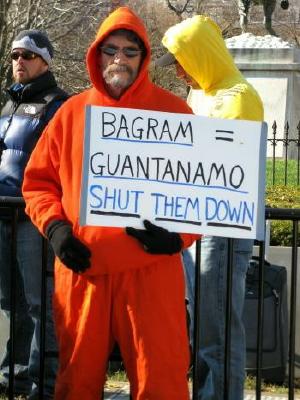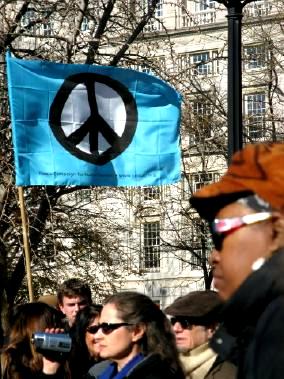 Independence Hall, Philadelphia, Obey the ConstitutionEarly U.S. presidents took quite seriously their oath to "preserve, protect and defend the Constitution of the United States." Many recent presidents have not. The president we need will obey the Constitution and also be its champion. This means changing executive-branch behavior. It also means asking Congress to amend or repeal laws that defy the Constitution. ✓ The president must appoint a first-rate Attorney General, one who is devoted to the Constitution and its Bill of Rights and who has both good judgment and courage. ✓ The president should ask the Attorney General to lead a review of federal laws, with special attention to ones passed after 9/11. The review should identify laws that have serious constitutional defects, are extremely verbose and confusing, and/or appear to be working poorly. The goal would be correction or repeal. Restore the Bill of RightsThe review should pay special attention to the Constitution's first ten amendments, our Bill of Rights. It's in tattered condition today, torn by government officials who should have been the first to defend it. Such officials scorned the First Amendment's guarantee of press freedom when they tried to intimidate reporters such as James Risen and Sharyl Attkisson, who worked on stories the officials did not want citizens to see. In 2015 congressional testimony, Attkisson declared: "Government officials weren't angry because I was doing my job poorly. They were panicked because I was doing my job well." She and Risen have defied intimidators. (More power to them! May the wind always be at their backs!) Some other journalists, though, may have backed off rather than face cold shoulders, retaliation, and isolation. ✓ Instead of suppressing free speech about government officials, President Grover Cleveland encouraged it. In his first inaugural address, he said that: "Every citizen owes to the country a vigilant watch and close scrutiny of its public servants and a fair and reasonable estimate of their fidelity and usefulness. Thus is the people's will impressed upon the whole framework of our civil polity...and this is the price of our liberty and the inspiration of our faith in the Republic." This is the kind of president we need. The Fifth Amendment provides that no person may "be deprived of life...without due process of law," and the Fourteenth Amendment applies the same command to the states. When state governments fund abortion through the federal-state Medicaid program, they attack both amendments.  The Fourth Amendment guarantees the people's right "to be secure in their persons, houses, papers, and effects, against unreasonable searches and seizures." The massive government surveillance of citizens' telephone and Internet activity since 9/11 defies the Fourth Amendment. That surveillance is financed, ironically, by citizens' own taxes. ✓ The president must give high priority to protecting human life and liberty in all of these areas. Ways to do this include: pressing for change in federal law; directing the Justice Department to intervene in key court cases; and using the presidency's "bully pulpit" to do much-needed educational work on the Bill of Rights. Pre-trial publicity is another issue that needs attention. Why do federal prosecutors release detailed press releases about their targets before trial? Given today's omnipresent and non-stop media coverage, how can juries not be biased against defendants in such cases? And what does this do to the Sixth Amendment's guarantee of "an impartial jury" for anyone accused of crime? The situation is even worse when the president comments on a case before or during trial. (Presidents Nixon, Reagan, Clinton, and Obama all did this.) Every president should follow a strict no-comment policy on criminal charges and trials, whether federal or local. ✓ Instead of talking about current cases, the president should explain why the legal presumption of innocence is so important. The best way to drive this home? Describe some of the over 100 people who were sentenced to death in various states between 1963 and 2014--but later were exonerated. Some endured many years on death row for crimes they did not commit. How did this happen? Police coerced suspects to make confessions. Prosecutors withheld key evidence from defense attorneys. Jailhouse informants and others perjured themselves. Some defense attorneys were incompetent. There were mistakes in DNA or other testing. All in all, a legal house of horrors. Most citizens probably have no idea how often this sort of thing happens. Respect State and Local Governments✓ The president should lead a return to more respect for state and local governments. The federal government now subsidizes them heavily and also hems them in with many regulations. This is not what the Founders intended. It tramples on something they prized highly: citizen control of the government closest to home. ✓ The president should ask Congress to end the donation of surplus U.S. military equipment to local police departments. President Obama put restrictions on this program, but it really should be ended. Intended to help states and cities, the program instead has caused much trouble. It has encouraged a widely-resented "militarization of police," one that threatens both the peace of our communities and the Bill of Rights. Police officers should not look like combat troops. They should not travel in armored personnel carriers, nor wear camouflage uniforms, nor view entire communities as enemies.  ✓ The killing of crime suspects by police--other than in cases of self-defense--involves the Fifth and Fourteenth Amendments and their provision that no one may be deprived of life without due process of law. When police are accused of misconduct, though, the presumption of innocence must still be upheld. Police officers have the same right to this that everyone else has. ✓ The president should question the use of federal criminal law to go after state officials for alleged corruption: Maryland Gov. Marvin Mandel of Maryland (a Democrat) in the 1970s, for example, and former Virginia Gov. Robert McDonnell (a Republican) more recently. Although Mandel was convicted and spent time in prison, a federal judge eventually overturned his conviction. The judge noted that "the jury was told it could convict for something that did not amount to a federal crime." Neither Mandel nor McDonnell was accused of corruption involving federal money or federal programs. Why, then, did federal prosecutors go after them? The prosecutions apparently were part of a post-Watergate effort to fight government corruption at all levels. After overturn of the Mandel conviction, Congress amended an old law that was supposed to prevent "wire fraud," and that law was used to go after McDonnell. He was convicted in 2014, but the U.S. Supreme Court later overturned his conviction. Federal prosecutors have enough to do in fighting corruption at the federal level. They should back away from prosecuting state officials over state affairs. The Constitution provides no authority for this. And there is a risk that some prosecutors, for political or career reasons, will destroy innocent state officials who just cannot win against the vast power of the federal government. An ambitious prosecutor may yearn for publicity as a giant-killer. What better target than a state governor? And the prosecutor may cut legal and ethical corners to win. Another possibility: A Republican prosecutor may want to end the career of a rising Democrat, or vice-versa. ✓ The president should ask the Attorney General to ensure that, when federal officials receive allegations about corruption of state officials, they just pass the information on to state prosecutors. Unless, of course, the allegations involve federal money: In that case, federal prosecution is the way to go. No More TortureThe George W. Bush administration's use of torture against terrorism suspects for years after 9/11 was a terrible violation of the Fifth Amendment, which provides that no one "shall be compelled in any criminal case to be a witness against himself." It also violated the Eighth Amendment, which bans "cruel and unusual punishments." In addition, torture is forbidden by federal law (18 U.S. Code, Sec. 2340) and by treaties we have ratified. Our Constitution makes treaties part of "the supreme Law of the Land." When President Ronald Reagan sent the Convention Against Torture to the Senate for ratification in 1988, he called torture "an abhorrent practice unfortunately still prevalent in the world today." It is tragic that the top leaders of a later Republican administration did not agree with him.  After 9/11, Vice President Richard Cheney promoted torture, and President Bush approved it. The torture continued until Barack Obama became president and--to his credit--stopped it. Yet his administration declined to prosecute those who designed and implemented the torture program. Had the public known the full extent of the torture while it was going on--the horrific details given in the Senate Intelligence Committee's 2014 report--there might have been an effort to impeach Bush and Cheney. If they and others involved in torture receive no punishment at all, that's an invitation for future officials to imitate their conduct. Especially since Cheney has said, "I'd do it again in a minute." President Gerald Ford used his constitutional power of clemency to pardon his predecessor, Richard Nixon, for offenses Nixon "has committed or may have committed" during his presidency. (This related especially to Nixon's part in the Watergate cover-up.) At the time, Nixon, who had resigned the presidency and was in very poor health, had not been charged with criminal offenses. Without Ford's pardon, though, he could have faced charges later. Some observers suggested that President Obama, who refused to order prosecution of those involved in torture, at least should have followed Ford's example and pardoned them. This, they believed, would have made it clear that torture is a crime and would have helped deter its use in the future. ✓ The evils of Watergate were real, but those of torture are far worse. The president we need should ask the attorney general to order a criminal investigation of the torture program. The president should neither rule out the possibility of pardon, nor promise it in advance. No president or vice president is above the Constitution. At his second inauguration, President George Washington went out of his way to stress that, if it should ever be found that he had violated the oath of office, then "I may (besides incurring constitutional punishment) be subject to the upbraidings of all who are now witnesses of the present solemn ceremony." May all of our future presidents obey the Constitution, as he did. No More Presidential WarsIn Article I, Section 8, the Constitution assigns the power to declare war to Congress--not the president. It has always been accepted that the president, as Commander in Chief, may and should repel any sudden attack on the U.S. But the president is supposed to have congressional authorization for action beyond that. In recent decades, though, presidents often have made war without congressional authorization. When Congress passed the War Powers Resolution of 1973, many hoped it would prevent the kind of presidential decisions that led to our long war in Vietnam. But the War Powers Resolution actually permits presidents to take military action without congressional authorization, provided that 1) the president notifies Congress of his action and 2) the action ends--or Congress authorizes war--within 60 days. The law certainly has not reduced U.S. interventionism abroad. Since 1973 we have sent troops and/or bombs to: Afghanistan, Bosnia, Grenada, Haiti, Iraq, Kosovo, Lebanon, Libya, Pakistan, Panama, the Philippines, Serbia, Somalia, Sudan, Syria, and Yemen.  Far from preventing war, the War Powers Resolution enables it. A president notifies Congress about the latest troop deployments or bombing; some members protest, but most do not. Soon there is trouble somewhere else, and the president sends in the troops or the Hellfire missiles once again. Very seldom do presidents, members of Congress, or the media go back afterwards to survey all the damage and lost lives in the country we have attacked. Seldom do they think about the people in wedding parties, or the boys who were collecting firewood for their families--and who were mistaken for "militants" and suffered horrific wounds or death from our Hellfire missiles. Rarely do they think about the many people whose homes were destroyed by our bombs and who now live miserable lives in refugee camps. ✓ The president we need will ask Congress to repeal the War Powers Resolution, saying that we must instead just obey the Constitution: "If I believe that we should go to war, I will ask you for a declaration of war. I do not have constitutional authority to make war by myself, and I will not do so." ✓ One president's allegiance to the Constitution, though, does not guarantee that other presidents will have the same loyalty. Congress could replace the War Powers Resolution with a law that defines a presidential war as a high crime that may lead to impeachment and removal from office. This would make presidents far more cautious in their use of power--more like George Washington and other early presidents. Working together, the president and the attorney general can restore governmental obedience to the Constitution. They can ensure that our country again will be, as the old hymn proclaims, a "sweet land of liberty."  LINKS FOR MORE INFO: Carl M. Cannon, "Taking Aim at Cops' Shoot-First Culture," realclearpolitics.com, June 7, 2015 Death Penalty Information Center, "The Innocence List," 2015 "Debate in Virginia Ratifying Convention" (1788 comments on torture by Patrick Henry and George Mason) Tim Devaney, "Senators Blast DOD Program that 'Militarized Police,'" The Hill, Sept. 9, 2014 Leonard Downie, Jr., "The Obama Administration and the Press: Leak Investigations and Surveillance in Post-9/ll America," Oct. 10,2013 (report of the Committee to Protect Journalists) Louis Fisher, "Basic Principles of the War Power," Journal of National Security Law & Policy, vol. 5 (2012) Charles Krauthammer, "Can Obama Write His Own Laws?" Washington Post, Aug. 15, 2013 Anthony D. Romero, "Pardon Bush and Those Who Tortured," New York Times, Dec. 8, 2014 Katharine Q. Seelye, "Other Presidents Who Weighed In on Big Cases," New York Times, July 24, 2009 Erik Slavin, "Judge: Obama Sex Assault Comments 'Unlawful Command Influence,'" Stars and Stripes, June 14, 2013 Matt Sledge, "Dick Cheney Would Torture Again," HuffingtonPost.com, Dec. 14, 2014 Ronald B. Standler, "Pretrial Publicity Prevents a Fair Trial in the USA," Feb. 21, 2004 David Thacher, "Don't End Broken Windows Policing, Fix It," The Marshall Project, Sept. 9, 2015 |